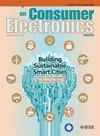A Single-Stage Boost-Derived Universal Wireless Charging System for Electric Vehicles
IF 4.3
2区 计算机科学
Q1 ENGINEERING, ELECTRICAL & ELECTRONIC
引用次数: 0
Abstract
This article proposes a novel single-phase, single-stage boost-derived universal wireless charging (UWC) system which works with universal (AC/DC) inputs. The single-stage wireless charging (WC) conversion is more economical and efficient than the conventional two-stage conversion. Realizing a good power factor and THD is challenging with conventional two-stage WC systems due to the front-end buck-derived configurations. Additionally, single-stage WCs based on matrix converters (MCs) are also reported; however, the absence of DC-link capacitance affects the secondary side current by double-line frequency ripples, and a higher number of switch counts prevents MCs from taking the forefront in single-stage conversion for WCs. In order to address the problems mentioned earlier, this article reports a unique single-stage boost-derived configuration that integrates a full-bridge inverter and a synchronous boost converter. The design can execute the two operations concurrently as it has one common high-frequency leg to optimize switch utilization. The proposed system can work in two different modes: (a) grid-to-vehicle (G2V) mode and (b) solar-to-vehicle (S2V) mode. The steady-state analysis, operating modes, simulation, experimental results, and comparative analysis between existing relevant literature and closed-loop control are presented in detail. Moreover, a down-scaled laboratory prototype is built to attest to the analysis and performance of the proposed work.电动汽车单级升压式通用无线充电系统
本文提出了一种新的单相、单级升压衍生的通用无线充电(UWC)系统,该系统适用于通用(AC/DC)输入。单段无线充电转换比传统的两段无线充电转换更经济、更高效。传统的两级WC系统由于其前端压力衍生配置,很难实现良好的功率因数和THD。此外,基于矩阵变换器(MCs)的单级WCs也有报道;然而,直流链路电容的缺乏通过双线频率波动影响二次侧电流,并且更高数量的开关计数使mc无法在wc的单级转换中处于领先地位。为了解决前面提到的问题,本文报告了一种独特的单级升压衍生配置,该配置集成了全桥逆变器和同步升压转换器。该设计可以同时执行两种操作,因为它有一个共同的高频分支,以优化开关利用率。所提出的系统可以在两种不同的模式下工作:(a)电网到车辆(G2V)模式和(b)太阳能到车辆(S2V)模式。详细介绍了稳态分析、工作模式、仿真、实验结果以及现有相关文献与闭环控制的对比分析。此外,还建立了一个缩小尺寸的实验室原型来验证所提出工作的分析和性能。
本文章由计算机程序翻译,如有差异,请以英文原文为准。
求助全文
约1分钟内获得全文
求助全文
来源期刊
CiteScore
7.70
自引率
9.30%
发文量
59
审稿时长
3.3 months
期刊介绍:
The main focus for the IEEE Transactions on Consumer Electronics is the engineering and research aspects of the theory, design, construction, manufacture or end use of mass market electronics, systems, software and services for consumers.

 求助内容:
求助内容: 应助结果提醒方式:
应助结果提醒方式:


